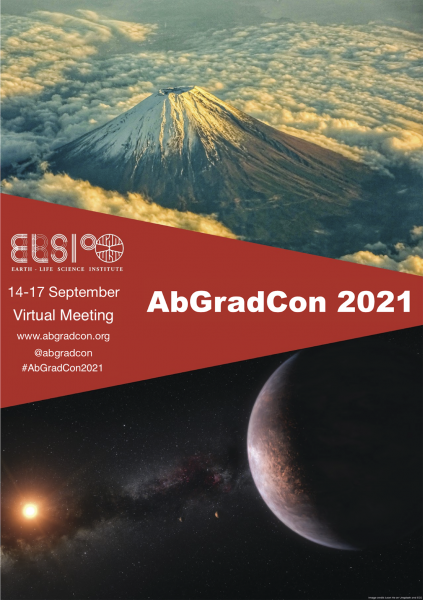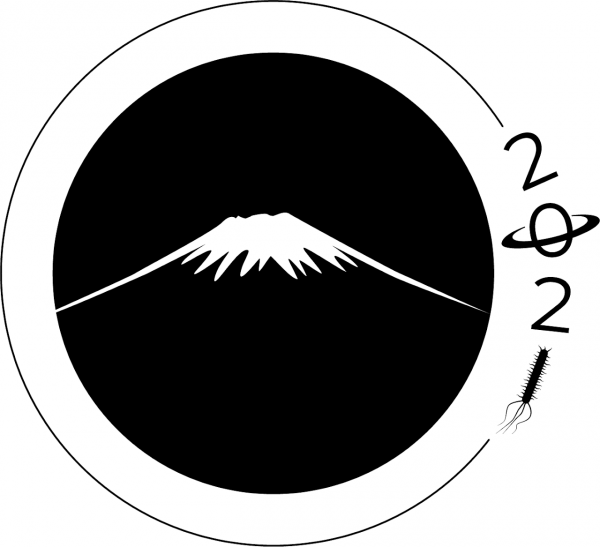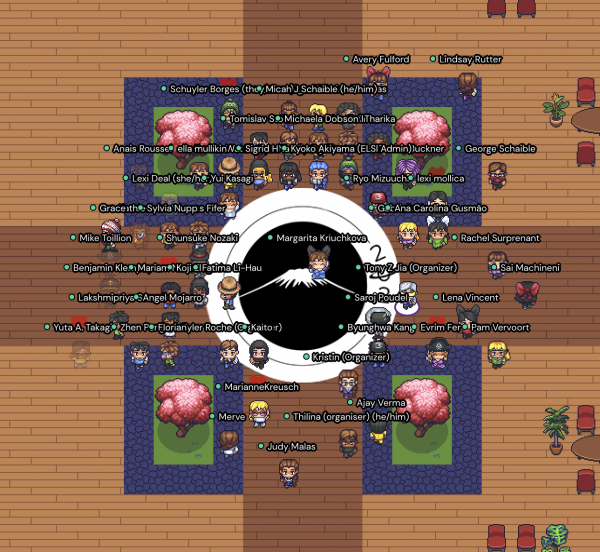AbGradCon 2021 was organised virtually by the Earth-Life Science Institute (ELSI) in September 2021. The organisers sought to provide a framework for future virtual meetings, not only in the astrobiology field, by highlighting all aspects of the conference coordination in detail. Trends in international and interdisciplinary collaboration for conference applicants, attendees, and the abstract review process also revealed insights into the state of the astrobiology field. The organisers hope that future AbGradCon meetings can use the information gleaned from this experience.

Astrobiology Graduate Conference (AbGradCon) is an annual conference organised by and for astrobiology students and early career researchers (i.e., postdocs) supported by the NASA Astrobiology Program. It is often a forum for students to give their first formal conference presentation, albeit in a less intimidating environment than a traditional conference. In 2020, ELSI was chosen to host an international version of the meeting, with goals to focus on international collaboration, but the COVID-19 pandemic postponed the meeting to 2021. Thus, virtual AbGradCon 2021 was held in September 2021. One hundred nineteen attendees from 26 different countries attended the meeting. Throughout the process of organising and executing the meeting, the organisers learned several important points on virtual meetings, international collaboration, and interdisciplinarity in astrobiology. To provide a blueprint for future virtual meetings, both in and outside the astrobiology field, the organisers sought to lay out all aspects of AbGradCon 2021, especially related to conference design, abstract evaluation, and international/interdisciplinary collaboration in astrobiology.
Since the COVID pandemic began in 2020, many conferences have been held virtually. While there are merits to holding a conference virtually, including increased diversity of participants (such as those with less financial resources) as well as a decrease in carbon footprint, there are still aspects of the in-person meeting that could not be replicated as fully (such as active, spontaneous discussions or social events). The AbGradCon 2021 organisers had also experienced successful and unsuccessful virtual meetings. Thus, the organisers uniquely approached the design of AbGradCon 2021 by focusing on replicating the aspects of in-person meetings that could be executed well virtually while amplifying unique aspects that only virtual meetings could supply. Here, the authors present their full organisational roadmap for AbGradCon 2021 by describing each aspect of the conference organisation and design in great detail. This was meant as a way to document the conference for future AbGradCon organisers (documentation of previous AbGradCon meetings, while reported to NASA and other relevant bodies, is not always publicly available). Similarly, although in-person meetings have returned to some regions in the world, other regions, such as Japan or other countries in Asia, still require more online-based or hybrid meetings due to various restrictions. Thus, it is very likely that many future conferences will continue to be at least hybrid-based. Thus, this paper also seeks to give ideas to organisers of other virtual conferences so that they may incorporate successful aspects of AbGradCon 2021 into their meetings.
AbGradCon 2021 co-chair Kristin Johnson-Finn, assistant professor at Rensselaer Polytechnic Institute (ELSI researcher at the time of the AbGradCon2021), states: “Through organising the AbGradCon meeting in a digital format, we learned a great deal. Our largest task was finding a way to satisfy the specific goals of community building, professional development, and scientific presentation for an international audience without the traditional in-person format. The solution was several sets of tailor-made options and collaborations, which provided opportunities that the typical Zoom-based symposium could not offer. Our lessons learned and choice of tactics provide a framework for the organisation of future digital meetings.”
The authors also did a statistical analysis of the applicants, attendees, and abstract review process, especially focusing on international and interdisciplinary collaboration parameters. The authors found that there were several trends in both of these categories that may reflect the state of the field. In particular, the authors found that the abstract scores of attendees from North America were higher than those from other regions. The reason may have been that more of the reviewers were from North America than from other regions. Perhaps it was because North America may have a long history of astrobiology research than other regions, resulting in slightly higher quality abstracts (for example, astrobiology is a growing field in many countries in Asia). This suggests that abstract evaluation processes for all conferences should be normalised so that submissions from attendees from all regions are treated fairly. Astrobiology is also a broad field, and traditional conferences often solicit reviewers to evaluate abstracts from their field. However, astrobiology is also an interdisciplinary field, and the authors implemented a system that matched reviewers with abstracts irrespective of field. The review results suggested no significant differences in abstract evaluation scores based on the reviewer or the submitted abstract’s field. Thus, for broad conferences (not only astrobiology-related), abstract evaluation irrespective of fields could help increase a holistic understanding of the various conference topics while also not giving up the rigor in being unbiased based on the research field.
While AbGradCon was not held in 2022, it will be held in the United States in 2023. Solicitations for site proposals are due on 7 October, and can be submitted here.


| Journal | International Journal of Astrobiology |
| Title of the paper | AbGradCon 2021: Lessons in digital meetings, international collaboration, and interdisciplinarity in astrobiology |
| Authors | Tony Z. Jia1,2,*, Kristin N. Johnson-Finn1, Osama M. Alian3, Irene Bonati1,4, Kosuke Fujishima1,5, Natalie Grefenstette2,6, Thilina Heenatigala1,7, Yamei Li1, Natsumi Noda1,8, Petar I. Penev9, Paula Prondzinsky1, Harrison B. Smith1 |
| Affiliations |
|
| DOI | 10.1017/S1473550422000258 |
| Online published date | 6 July 2022 |
